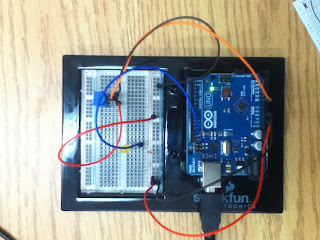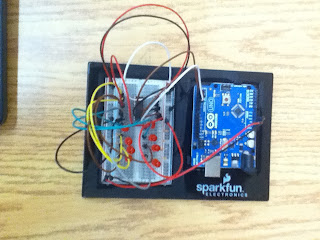Purpose:
Get 8 LEDs to blink on and off in a sequence.
Equipment:
-8 x LED
-10 x Wires
-8 x 560ohm resistor
-1 x Arduino Uno
-1 x Breadboard
Reference:
http://www.oomlout.com/a/products/ardx/circ-02
Program Details:
This experiment had included arrays. functions, and for loops in the code. It was fairly simple to pick up since the Arduino language is similar to Java.
Time to Complete:
20 minutes
Results:
No errors with this experiment, LEDs lit up without a problem.
Photos of Project:
Tips:
Similar to CIRC-01, just with 8 LEDs this time. Keep your LEDs, resistors, and wires consistently spaced out.
Further Work:
Change the sequence by playing with the order of the on and off lines of code.
Program Modifications:
The program is exactly the one from http://www.oomlout.com/a/products/ardx/circ-02
Program:
//An array that hold the pin each LED is connected to
int ledPins[] = {2,3,4,5,6,7,8,9};
void setup()
{
for(int i = 0; i < 8; i++) //loop to initialize each pin as an output
{
pinMode(ledPins[i],OUTPUT);
}
}
void loop() // Continuously runs
{
oneAfterAnotherNoLoop(); //calls the function oneAfterAnotherNoLoop
}
void oneAfterAnotherNoLoop()
{
int delayTime = 100; //sets a delay time
//turns LEDs on
digitalWrite(ledPins[0], HIGH); /*changes state of LED connected to pin 2 to high(on)*/
delay(delayTime); //delay equal to the value of delayTime
digitalWrite(ledPins[1], HIGH); /*changes state of LED connected to pin 3 to high(on)*/
delay(delayTime); //delay equal to the value of delayTime
digitalWrite(ledPins[2], HIGH); /*changes state of LED connected to pin 4 to high(on)*/
delay(delayTime); //delay equal to the value of delayTime
digitalWrite(ledPins[3], HIGH); /*changes state of LED connected to pin 5 to high(on)*/
delay(delayTime); //delay equal to the value of delayTime
digitalWrite(ledPins[4], HIGH); /*changes state of LED connected to pin 6 to high(on)*/
delay(delayTime); //delay equal to the value of delayTime
digitalWrite(ledPins[5], HIGH); /*changes state of LED connected to pin 7 to high(on)*/
delay(delayTime); //delay equal to the value of delayTime
digitalWrite(ledPins[6], HIGH); /*changes state of LED connected to pin 8 to high(on)*/
delay(delayTime); ////delay equal to the value of delayTime
digitalWrite(ledPins[7], HIGH); /*changes state of LED connected to pin 9 to high(on)*/
delay(delayTime); //delay equal to the value of delayTime
//Turns LEDs off
digitalWrite(ledPins[7], LOW); //*changes state of LED connected to pin 2 to high(on)*/
delay(delayTime); //delay equal to the value of delayTime
digitalWrite(ledPins[6], LOW); //*changes state of LED connected to pin 3 to high(off)*/
delay(delayTime); //delay equal to the value of delayTime
digitalWrite(ledPins[5], LOW); //*changes state of LED connected to pin 4 to high(off)*/
delay(delayTime); //delay equal to the value of delayTime
digitalWrite(ledPins[4], LOW); //*changes state of LED connected to pin 5 to high(off)*/
delay(delayTime); //delay equal to the value of delayTime
digitalWrite(ledPins[3], LOW); //*changes state of LED connected to pin 6 to high(off)*/
delay(delayTime); //delay equal to the value of delayTime
digitalWrite(ledPins[2], LOW); //*changes state of LED connected to pin 7 to high(off)*/
delay(delayTime); //delay equal to the value of delayTime
digitalWrite(ledPins[1], LOW); //*changes state of LED connected to pin 8 to high(off)*/
delay(delayTime); //delay equal to the value of delayTime
digitalWrite(ledPins[0], LOW); //*changes state of LED connected to pin 9 to high(off)*/
delay(delayTime); //delay equal to the value of delayTime
}
}












